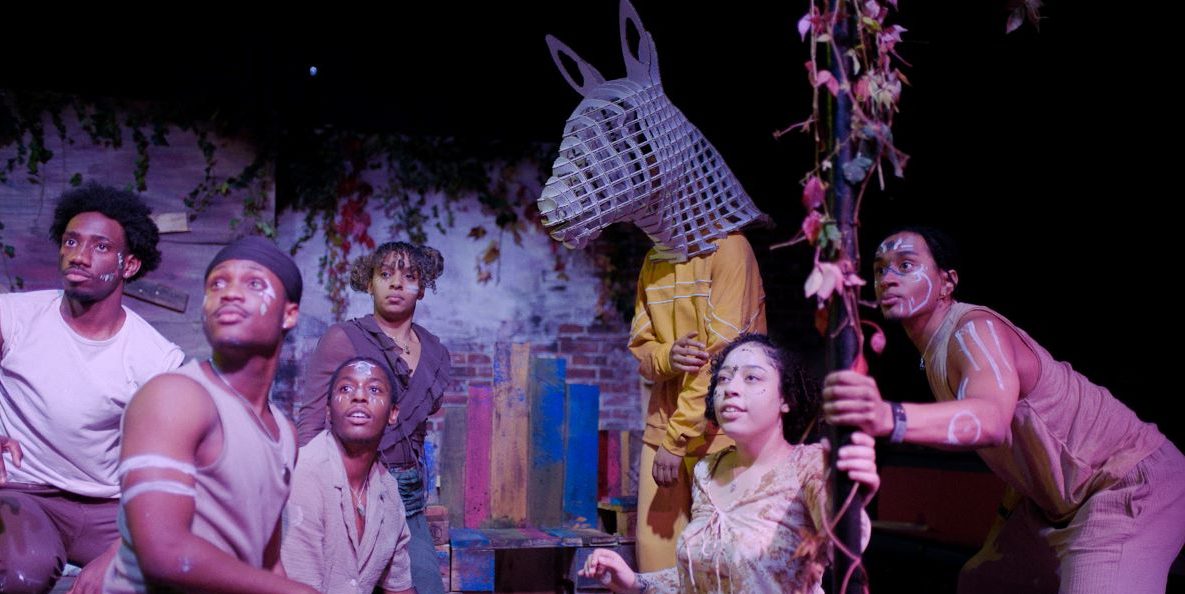For sixteen years now Intermission Youth Theatre has done what theatre at its best should always do – change lives. Under the inspiring leadership of Darren Raymond and his team, young people from a range of disadvantaged circumstances, with little or no experience of stagecraft, have come together to experience and perform Shakespeare. Each year a play inspired by one of the classic comedies or tragedies is adapted and developed over ten months to include contemporary street dialogue alongside Shakespeare’s original text. Last year it was a superb reworking of ‘Romeo and Juliet’ and this year it is ‘Midsummer Night’s Dream.’
Or rather.. ‘M.S.N.D.’
The assumption here is that a new drug has hit the streets which includes the transforming power to enable people to speak Shakespeare. Puck, Oberon and Titania are the first to come across and manipulate its powers, and from there the pattern of deceptions, mistaken identities and misunderstandings radiates outwards in familiar fashion, generating the world of the fairies and wreaking havoc in the lives of mortals, whether lovers or amateur actors.
There is a wonderful opening as the immediate first effects of the ‘drug’ generate a scatter of apparently spontaneous famous speeches from different plays by Shakespeare before we settle into the familiar groove of the enchanted forest, here reimagined as a nightclub called ‘the Playground’. The script is full of verbal wit illustrated with boisterous visual humour, yet there are also points of pathos and repose as some of the serious themes of the play mesh with the serious themes of today – family division, drug abuse, gender stereotyping, and social scapegoating among others.
It is a true ensemble performance full of confidence and joy in speaking the lines and embodying the characters. Though the stage area is small and quite cluttered with levels and columns the cast weave in and out with rare agility and panache and plenty of interaction with the audience. The only slight reservation is that with so many characters and plotlines (just as in the original) inevitably some aspects are blurred and elided – the ‘rude mechanicals’ are not so well developed as the fairies and the lovers, and we miss the comedy of ‘Pyramus and Thisbe’ altogether.
That said, the audience loved every minute of the evening’s pacy, sassy and inventive journey, and there were some excellent performances (this was Cast One) along the way. Li Ikoku-Smith was a wonderfully deadpan Bottom, who also carried off a very plausible donkey impersonation. Judah Meade had natural authority as Oberon while avoiding all traditional kingly airs. Maryse Baya found the mischief and flair needed for Puck, and Lylas Flora made the most of her scenes as Titania. The young lovers (with Egeus and Hippolyta added to the mix) were all well contrasted: Kwadwo Kwateng and Valerie Olweny stood out for the credibility and depth of their characterisations. The chorus of fairies was a consistently seething and moving foundation to the forest and the group petulance and joshing among the strolling players came over with conviction.
After the play concluded everyone stayed on for a discussion with the cast still on stage. This was wholly engrossing and inspiring, giving a picture of where these actors had come from, where they hoped to journey, and where some recent graduates of the programme have since travelled. The creative and personal impact of this kind of project was made manifest most movingly and demonstrated how theatre can act as a catalyst to create confidence, overcome prejudice and release talent into the wider community. When so much attention is devoted to the re-allocation of arts funding between elite cultural institutions perhaps more attention should be given to those organisations such as this, which use the best timeless materials of the past to make a palpable difference to present and future lives. These projects are superb examples of how to re-package the old while preserving its essence in a way that, to quote one of the cast members, turns ‘judgement into curiosity.’

